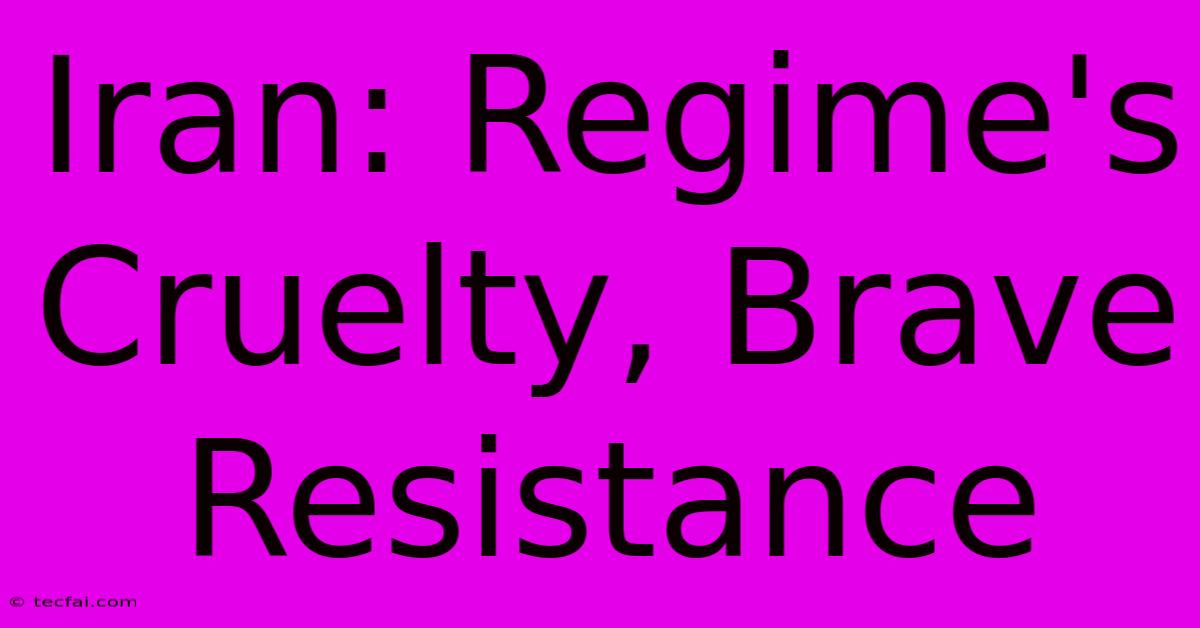Iran: Regime's Cruelty, Brave Resistance

Discover more detailed and exciting information on our website. Click the link below to start your adventure: Visit Best Website tecfai.com. Don't miss out!
Table of Contents
Iran: Regime's Cruelty, Brave Resistance
The Islamic Republic of Iran, since its inception in 1979, has been characterized by a complex interplay of authoritarian rule and persistent resistance. Understanding this dynamic requires examining the regime's brutal tactics, the courageous defiance of its people, and the global implications of this ongoing struggle.
The Regime's Reign of Terror: A History of Repression
The Iranian regime's cruelty is not a recent phenomenon; it's woven into the fabric of its existence. From the early days of the revolution, characterized by the summary executions of political opponents and the suppression of dissenting voices, to the current crackdown on protests, the pattern of violence and oppression remains chillingly consistent.
Systematic Human Rights Abuses:
- Extrajudicial Killings: The regime's security forces, including the Islamic Revolutionary Guard Corps (IRGC) and the Basij militia, are notorious for carrying out extrajudicial killings of protesters, activists, and journalists. These killings often go unpunished, fostering a climate of fear and impunity.
- Arbitrary Arrests and Detention: Individuals expressing even mild dissent are routinely arrested, held without charge, and subjected to torture and ill-treatment in overcrowded and unsanitary prisons. Political prisoners often face lengthy sentences based on vague charges, such as "moharebeh" (enmity against God).
- Suppression of Freedom of Expression: The regime tightly controls the media, restricts access to the internet, and harshly punishes those who dare to criticize the government or its policies. Journalists face imprisonment, censorship, and even death threats for reporting on human rights abuses.
- Religious and Ethnic Persecution: Religious minorities, particularly Baha'is and Christians, face systematic discrimination and persecution. Ethnic minorities, such as Kurds and Baluchis, also experience marginalization and repression.
The Seeds of Resistance: A People's Struggle
Despite the regime's brutal methods, the Iranian people have shown remarkable resilience and courage in their resistance. This resistance manifests in various forms:
The Women-Led Movement:
The ongoing protests ignited by the death of Mahsa Amini, a young woman arrested for allegedly violating the hijab law, highlight the bravery of Iranian women. Their defiance of the mandatory hijab, and their participation in protests despite the risk of brutal consequences, represent a powerful challenge to the regime's authority. This movement has gained global attention and solidarity.
Civil Disobedience and Protests:
Throughout its history, Iran has witnessed numerous waves of protests, demonstrating the persistent desire for freedom and democracy. These protests, often met with violent crackdowns, range from peaceful demonstrations to acts of civil disobedience, showcasing the Iranian people's determination to challenge the regime.
Underground Networks and Activism:
Despite the regime's surveillance and censorship, underground networks of activists, journalists, and human rights defenders continue to document abuses, expose corruption, and organize resistance. These networks play a crucial role in informing the international community and mobilizing support for the Iranian people.
Global Implications and the Path Forward
The situation in Iran has significant global implications. The regime's support for regional proxies, its pursuit of nuclear weapons, and its human rights record pose challenges to international security and stability. The international community must hold the regime accountable for its abuses, support the Iranian people's aspirations for freedom, and work towards a future where human rights are respected and democracy prevails. This requires a multifaceted approach involving:
- Targeted Sanctions: Sanctions focused on those responsible for human rights violations and the regime's nuclear program can exert pressure and limit its ability to repress its own people.
- International Condemnation: Strong and consistent condemnation of the regime's human rights abuses from international bodies and governments is vital in creating global awareness and pressure for change.
- Support for Human Rights Organizations: Providing support to human rights organizations working within and outside Iran allows for the continued documentation of abuses and the promotion of accountability.
The struggle for freedom in Iran is far from over. The Iranian people's unwavering bravery in the face of immense oppression continues to inspire hope for a future where human rights are respected and democracy prevails. The international community must play a vital role in supporting this struggle, ensuring a more just and equitable future for Iran.

Thank you for visiting our website wich cover about Iran: Regime's Cruelty, Brave Resistance. We hope the information provided has been useful to you. Feel free to contact us if you have any questions or need further assistance. See you next time and dont miss to bookmark.
Featured Posts
-
Polkinghornes Matildas Farewell
Nov 28, 2024
-
Chl Seeks Usa Prospects Win
Nov 28, 2024
-
Ancelottis Take Injuries Boost Real Madrid
Nov 28, 2024
-
Rogan Faces Abc Chairmans Criticism
Nov 28, 2024
-
Axed Vanderpump Rules Stars
Nov 28, 2024
